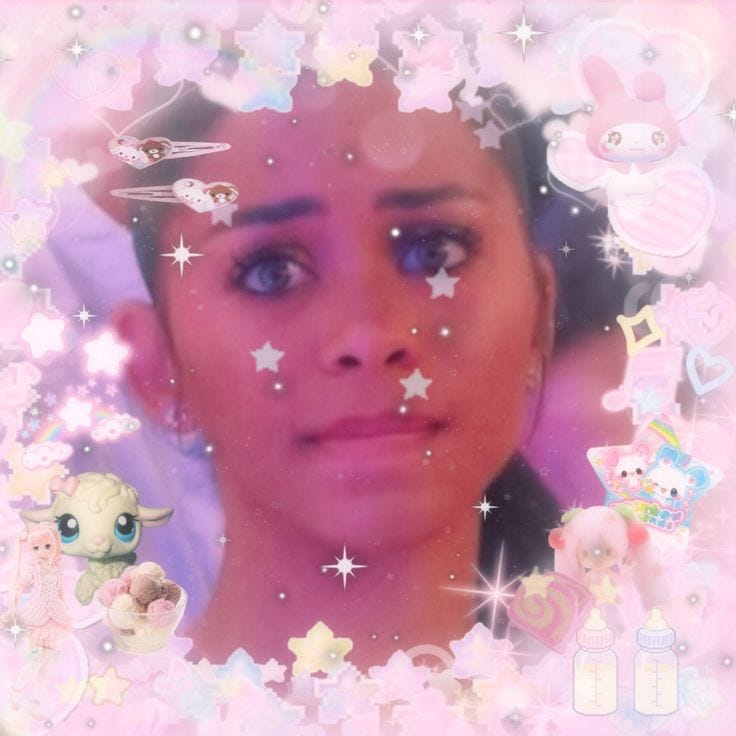I’ve always been an easy crier. Shocker, says anyone who’s ever had a conversation with me longer than ten minutes. My eyes well up when I feel anything strongly at all, whether that’s sadness, anger, happiness; you name it. It’s embarrassing in the way that all involuntary responses are embarrassing. My signature eye look consists of two staples: winged eyeliner, plus my already glassy eyes to begin with, that will inevitably ruin the outer corners of my aforementioned winged eyeliner nearly completely by the end of the day. At this point I’ve accepted it as part of me, like how I’ve learned to accept my cowlicks or the way my smile lines tend to overly define themselves when I laugh.
My best friend and I have always joked about how we’re polar opposites in so many ways, a big way being that one of us cries at everything regardless of emotion and the other rarely cries at anything at all. During family movie nights, no matter the genre of film we’re watching, my siblings can count on me crying at any scene that was obviously included to make viewers cry. They’ll turn their heads slowly toward my corner of the couch, realize I’m doing exactly what they thought I’d be doing, and sigh out of painful predictability. She’s crying again, guys, someone will say. Okay, and? I’ll reply between sniffles.
I’m also very easily upset, but I’m also extremely easy to excite and make happy. Every emotion I’ve ever felt has been felt to the extreme, and I know that some people might find that annoying, or scary, or terrifying. I don’t blame them. Men, especially, seem to view this kind of emotional availability as a character flaw. They’ve been conditioned to understand that feeling deeply is weakness, and as a byproduct of this understanding, tears are manipulation, and joy without irony is somehow less intelligent. I’ve watched them recoil in when I cry at commercials or get genuinely excited about finding a particularly cool rock on the sidewalk. But what some people don’t understand, not just men, is that having strong emotions is not the opposite of being smart. When I cry during movies, I’m allowing myself to connect with something larger than my own experience. And when I get excited about small things, I’m not being not naïve. I prefer to call it finding wonder in a world that constantly tries to tell us there’s nothing left to wonder about.
People use the word sensitive like it’s a diagnosis or something that needs to be fixed, but the truth is that it isn’t a malfunction. I think my heart has more room in it to care, to love, to hold others’ pain alongside my own. I feel it all in my chest, heavy and real. The joy of the people I love becomes my joy too, immediate and uncomplicated. The world will try to tell you that caring too much is a liability, but I feel like it’s the opposite. I think it’s a superpower that most people are too afraid to employ.
What some might call oversensitivity, I think is just having a big heart. When you feel everything so deeply, you don’t just feel your own pain more intensely, you feel everyone else’s too. I tear up when my friends tell me about their breakups because I genuinely feel the hurt right alongside them. When I see an elderly person sitting alone at a restaurant or on a sidewalk bench, I feel their loneliness like a physical weight in my chest. I’ve noticed that people who pride themselves on being unaffected tend to wear this indifference like it’s a badge of honor. Jokes on them, because having more capacity to feel means having more capacity to care.
Are the people who criticize emotional intensity secretly jealous of it? I used to feel ashamed of how much I felt. I’d apologize for crying, for getting too excited, for caring too deeply about things other people deemed not a big deal. But as a writer and musician, I started to realize that this shame was misplaced — that my emotionality and the intensity of it wasn’t something I needed to fix or suppress, it was actually the very thing that gave my creative works their special flair. My songwriting its brutal honesty, and my written works their diaristic intimacy. These extremes of feeling translate into extremes of expression. I watch other people navigate living with such careful composure, how they’ve learned to be wary of their own reactions, to second-guess every impulse toward joy or sadness or whatever emotion it is they’re clearly feeling. But those who approach life this way don’t see their emotional suppression for what it is, they just call it nonchalant. Whatever helps them sleep at night. And somewhere along the way, they decided that being whimsical was the same as being stupid, and that expressing delight was childish in the worst possible way.
This is something I think about a lot on a normal basis, just because my emotions do get the best of me more often than I’d like to admit, and I constantly have to remind myself that it’s not necessarily a bad thing to feel so much in a world that seems like it’s feeling less and less every day. But I’ve been thinking about this especially more often over the past month while watching the current season of Love Island USA. There’s our sweet Amaya, being completely herself, whimsical and passionate and unafraid to show her emotions, and genuine in a way that felt almost radical in the context of a villa filled with people afraid to be real.
“I’m a big, loving person, and you know, other people just view it as me being too much for them. But I’m not going to change who I am for anybody.”
What I love about her is that she never once apologized for being too much, because she knows that she could never be too much for the right person. The right person would never force her to dim her light, or even suggest it. But the men criticized for simply being true to herself, as if there was something wrong with that. They labeled her dramatic and tried to suppress her excitement; not one of them could fathom that someone might actually feel things as deeply as she did. Every guy she’s been paired up with so far has had something to say about her being nothing but a loving, excitable person. But they view it as a negative because they aren’t emotionally mature or ready for the love they claim to have come to the island for. They willingly came onto a show professedly about finding love, but when faced with someone who actually knew how to love without reservation, they got scared, and overcompensated for that fear by saying her behavior was the issue. They wanted the idea of love, the performance of it, but not the messy reality of someone who felt everything with her whole being.
Watching her get torn down for simply existing as her genuine self felt like watching a microcosm of how society treats women who refuse to diminish themselves. I saw myself in her rejection, in the way she tries to explain herself to people who had already decided she was too much before the conversation even began. I recognized the confusion and anger in her eyes all too well, as she was being punished for qualities that should have been celebrated and embraced. Maintaining access to childlike wonder and excitement while also being a functional adult requires more emotional intelligence than people realize. It means being able to feel everything without being controlled by those feelings.
I have an inner child, a little Faith who has always felt everything a little too passionately, sometimes more than her own good. She’s loud and demanding and completely unashamed of her own desires, but she’s not in control. She gets to have opinions about the sweetness of my coffee and gets to cry when lyrics feel a little too specific for comfort, but she doesn’t get to make decisions about my relationships or my career or how I treat people. That’s the difference between emotional intelligence and immaturity.
Most people have buried their inner child so deep they can barely remember what it felt like to be genuinely excited about anything. They’ve convinced themselves that cynicism is sophistication and look at someone like me, like Amaya, and see weakness because they’ve forgotten that it actually takes a lot of strength to stay open in a culture that seems to reject openness. These tears are not something I do, they’re something I am, and you can take it or leave it. Either way, I’ll manage. God forbid a girl cries a little. God forbid she’s in touch with her emotions.
Maybe those who label themselves as nonchalant have just forgotten what it feels like to be moved by something. I used to think I needed to learn how to feel less, but everyone else just needs to remember how to feel more. Aren’t you tired of being composed all the time? Of pretending to be less affected by things than you actually are? I don’t want to be too cool to cry at movies or too old to get excited about the little things. I don’t care if it makes everyone think I’m weird or childish or overly sensitive. I want to keep on feeling — feeling everything, and feeling it all the time.













you are my amaya papaya
i love crying & taking things personally & this & you